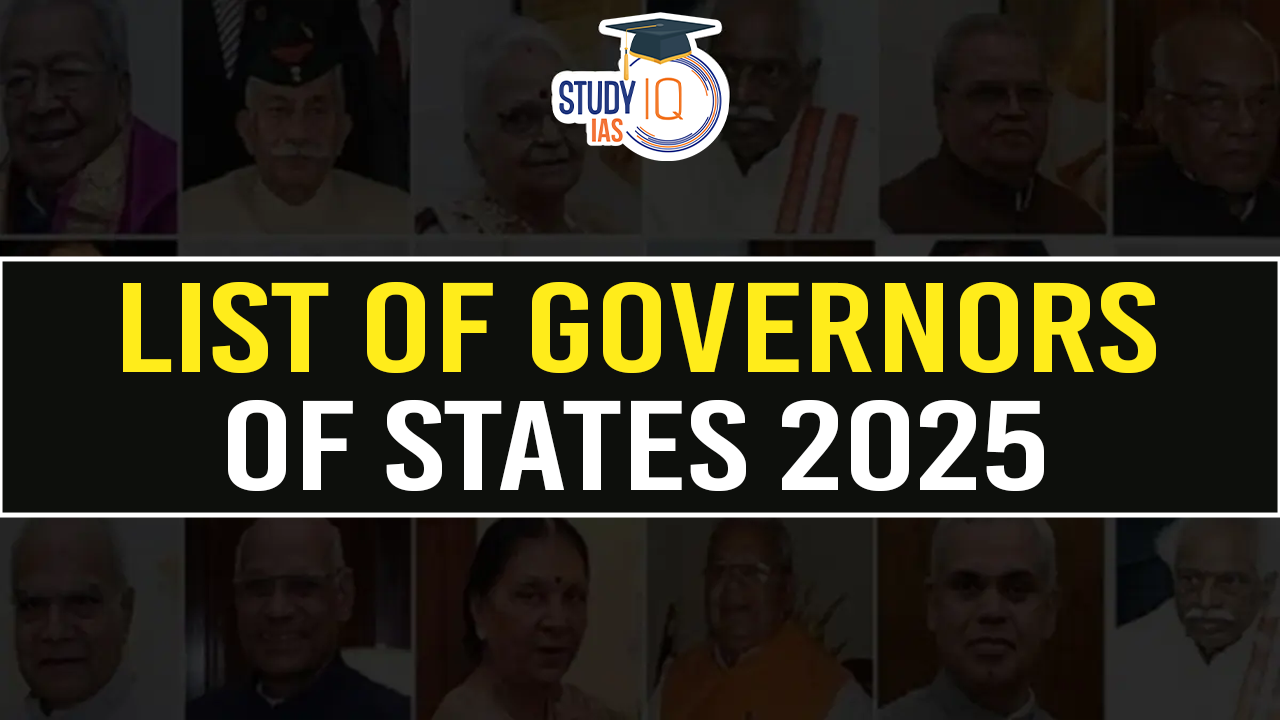Table of Contents
President Droupadi Murmu has reshuffled the leadership across five states, appointing two new governors and transferring three others. This strategic move aims to address political, administrative, and security challenges while strengthening governance. Here’s a detailed breakdown of the appointments, their significance, and implications.
Governor of States in India
The Governor is the constitutional head of a state and is appointed by the President of India for five years. The Governor enjoys executive, legislative, and judicial powers. Executive powers include:
- The appointment of the Chief Minister and other ministers.
- Assent to bills passed by the state legislature.
- The power to pardon or reduce sentences.
Legislative powers include summoning and proroguing the state legislature and addressing the house. Judicial authorities can grant pardons, reprieves, and suspensions of sentences. The Constitution of India outlines the Governor’s qualifications, appointments, and capabilities.
The current List of Governors of Indian States and the list of Lieutenant Governors of Indian Union Territories are provided along with some other important details related to the post of Governor of India in this article below, an important section of the UPSC Syllabus.
Arif Mohammad Khan Sworn in as 42nd Governor of Bihar
Arif Mohammad Khan assumed office as the 42nd Governor of Bihar, succeeding Rajendra Vishwanath Arlekar, who now serves as Kerala Governor. The swearing-in ceremony, held at Raj Bhawan in Patna, was officiated by Patna High Court Chief Justice K. Vinod Chandran. The event was attended by prominent leaders, including Chief Minister Nitish Kumar, his deputies, and Opposition Leader Tejashwi Yadav.
President Appoints New Governors for Five States
President Droupadi Murmu has reshuffled the leadership across five states, appointing two new governors and transferring three others. This strategic move aims to address political, administrative, and security challenges while strengthening governance.
| State | Governor | Significance |
|---|---|---|
| Manipur | Ajay Kumar Bhalla | Expert in managing ethnic conflicts and security issues. |
| Bihar | Arif Mohammed Khan | Administrative and intellectual leader with political acumen. |
| Kerala | Rajendra Vishwanath Arlekar | Experienced administrator to manage political challenges. |
| Odisha | Hari Babu Kambhampati | Ensures continuity in administrative leadership. |
| Mizoram | General Dr. V.K. Singh | Brings military expertise to enhance security and stability. |
President Droupadi Murmu Appoints New Governors for Nine States
President Droupadi Murmu appointed new Governors for nine states: Rajasthan, Telangana, Maharashtra, Punjab, Sikkim, Meghalaya, Assam, Jharkhand, and Chhattisgarh. Assam Governor Lakshman Prasad Acharya also received an additional charge of Manipur. The role of a Governor, appointed by the President, involves acting on the advice of the state’s Council of Ministers. However, Governors are often perceived as central government agents, leading to potential conflicts with state governments, especially those in opposition.
| State | Governor |
|---|---|
| Rajasthan | Haribhau Kisanrao Bagde |
| Telangana | Jishnu Dev Verma |
| Sikkim | Om Prakash Mathur |
| Jharkhand | Santosh Kumar Gangwar |
| Chhattisgarh | Ramen Deka |
| Meghalaya | C H Vijayashankar |
| Maharashtra | C.P. Radhakrishnan |
| Punjab | Gulab Chand Kataria |
| Assam & Manipur | Lakshman Prasad Acharya |
List of Present Governor of India 2024 State-wise
Here is the complete Governor of India List 2024 State-wise given below:
| State | Governor | Took Office | Tenure Length |
|---|---|---|---|
| Andhra Pradesh | Syed Abdul Nazeer | 20 February 2023 | 1 year, 159 days |
| Arunachal Pradesh | Kaiwalya Trivikram Parnaik | 16 February 2023 | 1 year, 163 days |
| Assam | Lakshman Acharya | 27 July 2024 | 1 day |
| Bihar | Arif Mohammed Khan | 27 December 2024 | New Appointment |
| Chhattisgarh | Ramen Deka | 27 July 2024 | 1 day |
| Goa | P. S. Sreedharan Pillai | 15 July 2021 | 3 years, 13 days |
| Gujarat | Acharya Devvrat | 22 July 2019 | 5 years, 6 days |
| Haryana | Bandaru Dattatreya | 15 July 2021 | 3 years, 13 days |
| Himachal Pradesh | Shiv Pratap Shukla | 18 February 2023 | 1 year, 161 days |
| Jharkhand | Santosh Gangwar | 27 July 2024 | 1 day |
| Karnataka | Thawar Chand Gehlot | 11 July 2021 | 3 years, 17 days |
| Kerala | Rajendra Vishwanath Arlekar | 27 December 2024 | New Appointment |
| Madhya Pradesh | Mangubhai C. Patel | 8 July 2021 | 3 years, 20 days |
| Maharashtra | C. P. Radhakrishnan | 27 July 2024 | 1 day |
| Manipur | Ajay Kumar Bhalla | 27 December 2024 | New Appointment |
| Meghalaya | C. H. Vijayashankar | 27 July 2024 | 1 day |
| Mizoram | General Dr. V. K. Singh | 27 December 2024 | New Appointment |
| Nagaland | La. Ganesan | 20 February 2023 | 1 year, 159 days |
| Odisha | Hari Babu Kambhampati | 27 December 2024 | New Appointment |
| Punjab | Gulab Chand Kataria | 27 July 2024 | 1 day |
| Rajasthan | Haribhau Bagde | 27 July 2024 | 1 day |
| Sikkim | Om Prakash Mathur | 27 July 2024 | 1 day |
| Tamil Nadu | R. N. Ravi | 18 September 2021 | 2 years, 314 days |
| Telangana | Jishnu Dev Varma | 27 July 2024 | 1 day |
| Tripura | N. Indrasena Reddy | 26 October 2023 | 276 days |
| Uttar Pradesh | Anandiben Patel | 29 July 2019 | 4 years, 365 days |
| Uttarakhand | Gurmit Singh | 15 September 2021 | 2 years, 317 days |
| West Bengal | C. V. Ananda Bose | 23 November 2022 | 1 year, 248 days |
List of Lieutenant Governors for UT
Here is the complete List of Lieutenant Governors & Administrators for Union Territories (UT) given below:
Lieutenant Governors
| Union Territory | Elected Legislature | Name | Took Office | Tenure Length | Appointed By |
|---|---|---|---|---|---|
| Andaman and Nicobar Islands | No | Devendra Kumar Joshi | 8 October 2017 | 6 years, 294 days | Ram Nath Kovind |
| Delhi | Legislative Assembly | Vinai Kumar Saxena | 26 May 2022 | 2 years, 63 days | Ram Nath Kovind |
| Jammu and Kashmir | Legislative Assembly | Manoj Sinha | 7 August 2020 | 3 years, 356 days | Ram Nath Kovind |
| Ladakh | No | B. D. Mishra | 12 February 2023 | 1 year, 167 days | Droupadi Murmu |
| Puducherry | Legislative Assembly | Kuniyil Kailashnathan | 27 July 2024 | 1 day | Droupadi Murmu |
Administrators
| Union Territory | Name | Assumed Office | Time in Office | Appointed By |
|---|---|---|---|---|
| Chandigarh | Gulab Chand Kataria | 27 July 2024 | 1 day | Droupadi Murmu |
| Dadra and Nagar Haveli and Daman and Diu | Praful Khoda Patel | 26 January 2020 | 4 years, 184 days | Ram Nath Kovind |
| Lakshadweep | Praful Khoda Patel | 5 December 2020 | 3 years, 236 days | Ram Nath Kovind |
Check out the linked article on the UPSC Syllabus 2024 Here!
First Governors of India
Candidates can go through the list of first governors of India from the below table:-
| State | First Governor | Term |
| Andhra Pradesh | C. M. Trivedi | 1953-1957 |
| Assam | Muhammad Saleh Akbar Hydari | 1947-1948 |
| Bihar | Dr. Rajendra Prasad | 1947-1948 |
| Bombay (Now Maharashtra and Gujarat) | Raja Maharaj Singh | 1947-1948 |
| Madhya Pradesh | Dr. Kailash Nath Katju | 1952-1957 |
| Mysore (Now Karnataka) | Jayachamarajendra Wadiyar | 1949-1956 |
| Orissa (Now Odisha) | Asaf Ali | 1947-1948 |
| Punjab (Now Punjab, Haryana, and Chandigarh) | Chandulal Madhavlal Trivedi | 1947-1952 |
| Rajasthan | Sardar Hukam Singh | 1948-1952 |
| Uttar Pradesh | Hormasji Peroshaw Mody | 1947-1952 |
First Women Governor of India
- The first woman governor of India was Sarojini Naidu, who served as the Governor of Uttar Pradesh from 15 August 1947 to 2 March 1949.
- She was a renowned poet, writer and freedom fighter, and played an important role in India’s struggle for independence.
- Naidu was also the first Indian woman to become the President of the Indian National Congress and was actively involved in various social and cultural movements.
- As the Governor of Uttar Pradesh, she worked towards improving the education system and promoting women’s rights.
Governor of India Post Criticism
Experts have criticised the post of Governor in India on the following grounds.
- Overstepping the Constitutional Limits: Critics argue that Governors have frequently overstepped their constitutional limits, by interfering in the functioning of state governments, bypassing the advice of the Council of Ministers, and acting as agents of the central government. This has often led to political instability and erosion of federal principles.
- Partisan Actions: Governors have also been accused of acting in a partisan manner, by favouring certain political parties or individuals, and disregarding the principles of neutrality and impartiality. This has been particularly evident in cases where Governors have recommended the President’s Rule or disqualified MLAs on grounds that were seen as politically motivated.
- Delay in Appointments: Another criticism is that Governors have delayed or blocked appointments of judges, bureaucrats, and other officials, leading to a backlog of vacancies and adversely affecting the functioning of state institutions.
- Excessive Discretion: Some critics argue that Governors have been given excessive discretion under the Constitution, and this has led to arbitrary exercise of powers, lack of transparency, and abuse of authority. For instance, Governors have often granted pardons, commutations, and remissions of sentences, without providing sufficient reasons or following due process.
Reforms Needed for Governor of India Post
There have been several suggestions for reforms related to the post of Governor in India, including:
- Appointment Process: The appointment process of Governors needs to be more transparent and non-partisan, ensuring that only individuals with impeccable integrity are appointed.
- Role of Governor: The role of the Governor should be redefined to ensure that the post is not misused for political purposes. The Governor should not act as a representative of the Central Government, but rather as a neutral arbiter.
- Removal Process: The process for the removal of Governors needs to be clearly defined and non-partisan. It should not be possible for a ruling party to remove a Governor simply because they do not agree with them.
- Tenure: The tenure of Governors needs to be fixed to ensure that they are not removed arbitrarily. A fixed tenure would also ensure that Governors are not beholden to the ruling party.
- Powers: The powers of Governors need to be clearly defined, and they should not have powers that are in conflict with the elected government. Governors should act as a bridge between the state government and the central government, and not act as an obstacle to the functioning of the state government.


 Chief Election Commissioner And Other El...
Chief Election Commissioner And Other El...
 Centre urges States, UTs to Enforce Sect...
Centre urges States, UTs to Enforce Sect...
 Salient Features of Indian Constitution,...
Salient Features of Indian Constitution,...




















